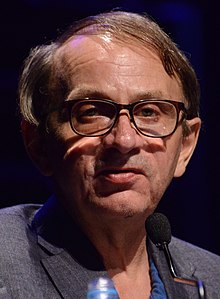
Back Michel Houellebecq Afrikaans ميشال ويلبك Arabic ميشال ويلبك ARZ Mişel Uelbek Azerbaijani میشل ولبک AZB Michel Houellebecq BAR Мішэль Уэльбек Byelorussian Мишел Уелбек Bulgarian Michel Houellebecq BS Michel Houellebecq Catalan
Michel Houellebecq | |
|---|---|
 Houellebecq in 2016 | |
| Born | Michel Thomas 26 February 1956 Saint-Pierre, Réunion, France |
| Occupation | Novelist, filmmaker and poet |
| Nationality | French |
| Notable works | Atomised The Map and the Territory Submission |
| Notable awards | |
Michel Houellebecq (French: [miˈʃɛl wɛlˈbɛk]; born Michel Thomas, 26 February 1956 or 1958)[1][2] is a French author of novels, poems and essays, as well as an occasional actor, filmmaker and singer.
His first book was a biographical essay on the horror writer H. P. Lovecraft. Houellebecq published his first novel, Whatever, in 1994. His next novel, Atomised, published in 1998, brought him international fame as well as controversy. Platform followed in 2001. He has published several books of poetry, including The Art of Struggle in 1996.
An offhand remark about Islam during a publicity tour for his 2001 novel Platform led to Houellebecq being taken to court for inciting racial hatred (he was eventually cleared of all charges). He subsequently moved to Ireland for several years,[3] before moving back to France, where he currently resides.[4] He was described in 2015 as "France’s biggest literary export and, some say, greatest living writer."[5] In a 2017 DW article, he is dubbed the "undisputed star, and enfant terrible, of modern French literature".[6]
In 2010, he published The Map and the Territory, which won the prestigious Prix Goncourt. In 2015, his next novel, Submission, sparked another controversy for its depiction of Islam. He was also recently accused of plagiarism concerning Submission.[7][8] Anéantir was published in 2022.
- ^ Houellebecq was officially born in 1956, but gave out his birth year to be 1958, before it was revealed by a journalist in the biography Houellebecq non autorisé.
Flower, Jon (2013). Historical Dictionary of French Literature. Scarecrow Press. p. 246. ISBN 9780810879454.
Riding, Alan (10 September 2005). "The French Still Obsess Over Their Gloomy Novelist of Despair". The New York Times. Archived from the original on 7 November 2017. Retrieved 19 February 2017. - ^ In his own 2005 autobiographical account, "Mourir", published on his – now defunct – personal website following the publication of the aforementioned biography, the author explained that he was "more likely" born in 1958, and that his mother, by her own admission, managed to have the date changed on his birth certificate to allow him to enter school at age four, as she was convinced that he was intellectually gifted. "I was born in 1956 or in 1958, I don't know. More likely in 1958. My mother always told me that she had faked the birth certificate so that I could go to school at age four instead of six – I guess that there was no pre-school at the time. She had convinced herself that I was intellectually precocious [un surdoué] — because at age three, so was I told, I had learned to read by myself, using cubes, and one evening coming home she had found me, utterly surprised, casually reading the newspaper. That she may have had the power to do so, there is no doubt: the birth certificates were handwritten and roughly made, and she really was among the dignitaries in La Réunion, she had influent acquaintances [...]."
- ^ The Sex Export the Independent on Sunday, 21 August 2005
- ^ "Michel Houellebecq assure que son nouveau livre n'est pas une "provocation" En savoir plus sur". Le Monde. 4 January 2015. Archived from the original on 4 January 2015. Retrieved 4 January 2015.
- ^ Angelique Chrisafis. Michel Houellebecq: "Am I Islamophobic? Probably, yes" Archived 20 October 2017 at the Wayback Machine The Guardian, September 2015; accessed 6 November 2017
- ^ "A selection of France's best contemporary writers | DW | 11.10.2017". Deutsche Welle. 11 October 2017. Retrieved 10 September 2020.
- ^ "El Hadji Diagola, écrivain franco-sénégalais, poursuit Houellebecq et ses éditeurs pour plagiat".
- ^ "El Hadji Diagola contre Michel Houellebecq au tribunal judiciaire de Paris – Jeune Afrique". 19 January 2022.